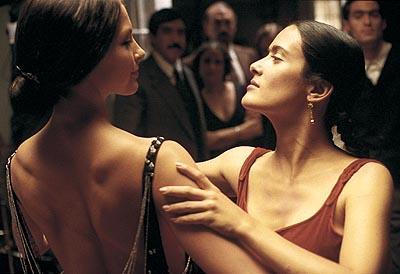FRIDA

Reviewed by Sam Hatch
Salma Hayek stars in and produces a very personal biopic of Mexican artist/free thinker Frida Kahlo. Julie Taymore (Titus) brings a strong vision to the proceedings, and crafts an excellent testament to a woman of many talents and her tumultuous relationship with the communist artist Diego Rivera (Alfred Molina).
Beginning in Mexico City in the 1920s, the film explores how Frida's life is changed forever by a bus accident that leaves her body severely damaged. The accident itself is interestingly captured as a thing of both danger and wonder - as there are just as many slow motion shots of shimmering gold dust and bright blue birds as there are of people being thrown about and shattered glass erupting. This scene alone remarkably captures the beauty and pain inherent in Kahlo's work. In a cool artistic ‘trip' sequence, stop motion animation artists the Brothers Quay craft a short piece commenting on Frida's hospital stay, with Day of the Dead skeletons taking the place of human doctors. It's another great moment mixing fantastic visuals with a powerful sound mix, and goes to show how independent films can give ‘blockbuster' films a run for their money with a little inventiveness.
During Frida's downtime she focuses on painting, and once she manages to walk again (to the great surprise of her family) she immediately seeks out Senor Rivera (who she repeatedly calls ‘panzon') to ask his opinion of her work. Diego is a serial womanizer, but Kahlo is more than a match for him – in fact she knows already that if he wants to sleep with her he'll lie about her artistic talent. The fact that she's onto his game doesn't deter him, and soon the two become lovers, more because of how much alike they are than anything else. Diego introduces her to his radical friends (and ex-wife portrayed by Valeria Golino) and in one great party scene Kahlo outdrinks the fellas to earn a dance with Ashley Judd as the actress Tina Modotti. Frida's sexuality is yet another aspect in which she trumps Diego, as later she beds one of his mistresses and is told that she had outperformed her husband.
Though strong in her ideals and spirit, Frida doesn't capitalize on her talent, and is content to let Diego bask in the limelight. This eventually leads them to move to New York (or Gringolandia as they call the United States) to work on a mural commissioned by Edward Norton's Nelson Rockefeller. This period is represented by another brilliant montage where Diego Rivera is portrayed as King Kong and Frida as a helpless woman in a high-rise apartment. Even before this daydream she has referred to Diego as her ‘little monster', and this illuminates their relationship – something volatile is bound to occur, but they're both drawn to the other like a moth to a flame.
Their stint in New York is ultimately cut short by Rivera's inability to sever his art from his politics, which causes the deal to sour. Once back in Mexico, things go very wrong when Diego's philandering eye catches a more familial prey. His affairs don't bother Frida as long as they're impersonal, but she finally conjures the strength to part from the man to explore her own work and prosper for a time in Paris.
It's their ideals that ultimately cause their orbits to connect once more, as Diego is forced to plead with Kahlo to allow the communist refugee Leon Trotsky to stay with her father whilst living in exile in Mexico. Geoffrey Rush is delightful as Trotsky, and strikes up an instant rapport with Frida. Through this relationship, she is finally able to wound Rivera as much as he had hurt her with his earlier affair. She learns that the only way to hurt the man is through his ideals.
Hayek has gotten plenty of notice for ‘going ugly' by sporting the by-now famous unibrow, but it should be said that she captures the fire and spirit of a woman who lives her entire life in emotional and physical pain, yet refuses to give credence to either.